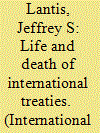| Srl | Item |
| 1 |
ID:
164673


|
|
|
|
|
| Summary/Abstract |
Political leaders are ultimately responsible for their country's foreign policy, but our understanding of how executive turnover affects the likelihood of international treaty ratification remains limited. For contributing to this debate, I define leader change as the replacement of the executive leader by a new one who relies on different social groups for support. Focusing then on those cases where new leaders can assume office only from predecessors who plausibly supported treaty ratification, I expect that—in light of the predecessor's support for an agreement and the change in the domestic support base—leadership turnover makes ratification less likely. The empirical implication is tested with quantitative methods using data on multilateral treaties of the post–Cold War era. The main findings and a series of additional analyses provide strong and robust evidence for the theoretical argument. This research sheds new light on the determinants of multilateral cooperation as well as the role of government leaders in international affairs and foreign-policy decision-making.
|
|
|
|
|
|
|
|
|
|
|
|
|
|
|
|
| 2 |
ID:
070958


|
|
|
|
|
| Publication |
2006.
|
| Summary/Abstract |
The ratification process for international treaties has become increasingly politicized in many democratic states. But while scholars have devoted attention to the negotiation of international agreements, few have studied ratification struggles that define the ultimate success or failure of international commitments. Fewer still have examined the dynamics of this process in comparative perspective. This article explores the politics of contemporary international treaty ratification processes across democratic regimes. Drawing on two-level game theory, I posit that the likelihood of ratification success is often a function of elite strategies for treaty ratification, regime type (which conditions executive-legislative relations), interest group pressure, and public opinion in the domestic political environment relative to international commitments. A structured, focused comparison of case studies analyzes experiences of the United States, Canada, and Germany in ratification struggles in the past decade. I conclude that the likelihood of successful treaty ratification across issue areas depends primarily upon executive strategies and regime type within certain scope conditions. These results provide evidence of ways that external-internal linkages can affect treaty ratification and suggest the need for greater attention to the development of scope conditions of international cooperation.
|
|
|
|
|
|
|
|
|
|
|
|
|
|
|
|